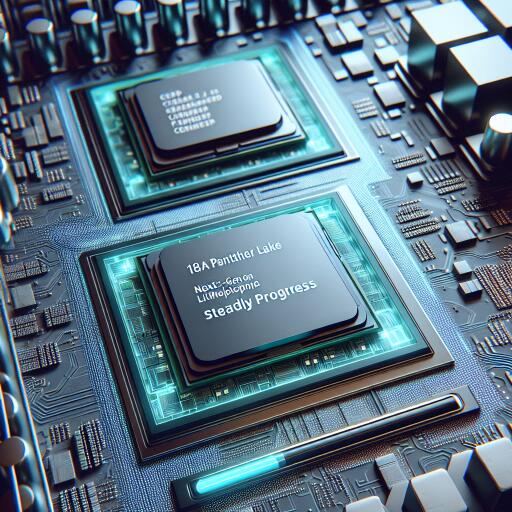Intel’s Next-Gen 18A Panther Lake and Clearwater Forest CPUs Show Promising Progress
In a significant step forward for semiconductor technology, Intel has recently shared exciting updates about its 18A manufacturing process, which promises to bring major advancements in CPU performance and power efficiency. This next-generation technology, representing a leap to a 1.8nm-class node, marks a crucial milestone for Intel’s ambitions in the foundry sector.
At the heart of this progress are two key Intel developments: the Panther Lake client processor and the Clearwater Forest CPU designed for data centers. Both products have achieved significant milestones, having successfully powered on and currently undergoing booting procedures. The Panther Lake processor is not only booting Windows but is also doing so with promising yield rates, significantly ahead of its qualification milestones. On the other end, the Clearwater Forest CPU is actively booting operating systems and demonstrating impressive performance metrics within Intel’s internal tests.
Intel’s 18A process is particularly noteworthy for being the company’s second endeavor that utilizes gate-all-around RibbonFET transistors and an innovative backside power delivery mechanism known as PowerVia. These advancements are particularly key for high-power applications such as data centers, where efficiency and power management are paramount. Compared to its 2nm-class predecessor, the 18A process is expected to deliver a 10% improvement in performance per watt, thanks to its optimized RibbonFET design among other technical enhancements.
The anticipation for Intel’s 18A technology extends far beyond the company’s labs. It has sparked considerable interest among potential Intel Foundry customers, especially given its projected competitive edge over similar nodes like TSMC’s 3nm and 2nm-class processes expected around 2024-2025. This keen interest underscores the importance of Intel’s ecosystem partners — including industry stalwarts such as Ansys, Cadence, Synopsys, and Siemens EDA — to fine-tune their tools in alignment with Intel’s Process Design Kit (PDK) 1.0. This collaboration will facilitate the finalization of designs by leading clients and encourage others to commence their development endeavors on the 18A platform.
Intel has announced that ecosystem partners are already updating their electronic design automation (EDA) and IP process flows and tools to cater to the 18A PDK 1.0. This is a crucial step that will allow customers to embark on their final production designs. With continuous interest from external foundry customers, who are actively designing on Intel 18A, the momentum suggests a robust vote of confidence in Intel’s integrated device manufacturing strategy and its broader systems foundry approach.
Looking ahead, Intel anticipates the first external customer tapeout of an 18A design in the first half of 2025. This timeline points to high-volume production kicking off in the first half of 2026, placing Intel’s 18A slightly behind TSMC’s N2 (2nm-class technology) planned for mass production in the latter half of 2025. Despite this, the advancements and interest in Intel’s 18A process signal a strong future for the company’s foundry services and a competitive stance in the rapidly evolving semiconductor industry.
The journey towards reducing transistor size and enhancing chip performance and power efficiency is an ongoing challenge for semiconductor companies worldwide. Intel’s steady progress on its 18A fabrication process not only represents a landmark achievement in this endeavor but also a strategic move to strengthen its position in the global foundry market. As we continue to witness these technological leaps, the impact on computing performance, energy efficiency, and the broader tech ecosystem is poised to be significant, heralding a new era of semiconductor innovation.









